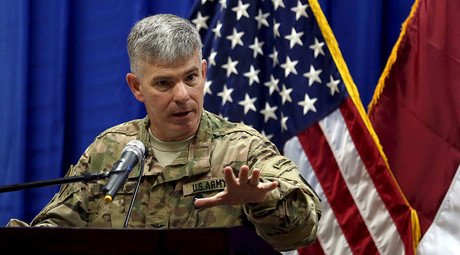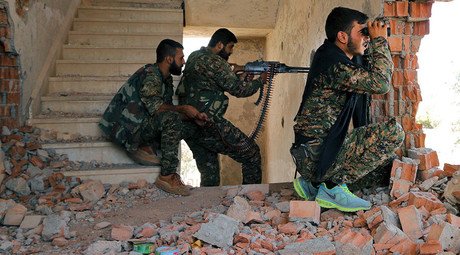50 ton-question: Who got US ammo intended for anti-ISIS Arabs?

Arab rebels in northern Syria say they have received none of the ammunition air-dropped by the US. The supplies appear to have ended up with Kurdish fighters, whose anti-ISIS offensive stalled following protests from US ally Turkey.
The Pentagon said the shipment dropped by US airplanes on October 11 was intended for the “Syrian Democratic Forces,” an alliance of Arabs and Kurds several thousand strong intent on attacking the Islamic State (IS, formerly ISIS/ISIL) capital of Raqqa. The group’s existence was announced just hours before the first airdrop.
The newly minted coalition consists of the al-Sanadid Arab tribal militia, a Christian group dubbed the Assyrian Military Council, and the Burkan al-Furat (“Euphrates Volcano”), a joint Kurdish-Arab group on the Raqqa front, as well as the formidable Kurdish YPG militia, which outnumbers all the other forces by 4 to 1, according to the Washington Post.
US ‘adjusts’ aid program to supply new rebel group in Syria
http://t.co/z7jWEjUbetpic.twitter.com/mjw3iAgcW7
— RT America (@RT_America) October 13, 2015However, no Arab units have received any of the ammunition so far, Bandar al-Humaydi, head of the al-Sanadid militia, told a McClatchy reporter by phone on Tuesday.
"We got nothing, and it’s not clear at all [if we will],” al-Humaydi said.
“Maybe our partners, the Kurds did,” added his father, Sheikh Humaydi Daham al Hadi, head of the Shammar tribe.
“I don’t know where they went,” the commander of Thuwar al-Raqqa, an Arab unit that is part of Burkan al-Furat, told the Washington Post. “There are also front lines in Hasakah, so maybe the ammunition will be used there.”
Those 50 tons of ammo dropped into northern Syria for Arab coalition Raqqa offensive? Arabs say they got nothing. https://t.co/liFHF1X3KK
— Michael B. Kelley (@MichaelBKelley) October 21, 2015According to one senior official, the airdrop landed in the Hasakah province and was retrieved by the YPG. Salih Muslim, a leader of the YPG’s political wing, thanked the US for the ammunition and promised to share it with the Kurds’ Arab allies.
Kurdish commanders, however, told the Post the ammunition will be distributed at the discretion of the Syrian Democratic Forces – whose existence was announced on the day of the airdrop. The supplies could go to anyone along the 435-mile frontline against Islamic State.
“The Syrian Democratic Forces will decide which front the weapons will be given to, where the battle will be fought and who will get the weapons,” said Haki Kobane, a Burkan al-Furat commander. He added that 50 tons was simply not enough to do anything.
#Syrian#Kurdish PYD leader says U.S. delivers 50 tons of ammunition, more underway http://t.co/lEix9X4Tas
— Kurd Net (@ekurd_net) October 15, 2015The US has maintained that the supplies were sent to the “Syrian Arab Coalition,” a name they use to refer to the Sunni and Christian Arab groups within the SDF. There were no indications that “any of that equipment was shared with any other groups,” Pentagon press secretary Peter Cook told reporters on October 15.
On Tuesday, Cook repeated the assertion that the airdrop was for the Syrian Arab Coalition. “It was successful. It went where it was intended, to the people who were intended to receive it,” he said.
Another Pentagon spokesman, Colonel Patrick Ryder, told the Washington Post that the US military had “high confidence that the ammunition we dropped was retrieved by the intended recipients, which were Syrian Arab groups fighting ISIL.”
READ MORE: Russian, American envoys in Turkey warned against helping Syria’s Kurds
The notion of US ammunition ending up in Kurdish hands has angered Turkey, which only recently agreed to open its airbases to US drones and bombers operating against Islamic State. Turkey has fought a 30-year counter-insurgency against its Kurdish minority, which lives along the Syrian border, and considers the Kurdistan Worker’s Party (PKK) a terrorist organization. While Washington has also placed the PKK on the terrorist list, the US does not extend that label to the YPG in Syria or its political wing, the PYD, despite their close ties.
“We view the PYD as a terrorist group and we want all countries to consider the consequences of their cooperation,” one Turkish official told Reuters on October 13, protesting what he called US and Russian support for the Kurds. Turkey has even threatened to intervene if the Kurdish forces push west of the Euphrates.
LISTEN MORE:














